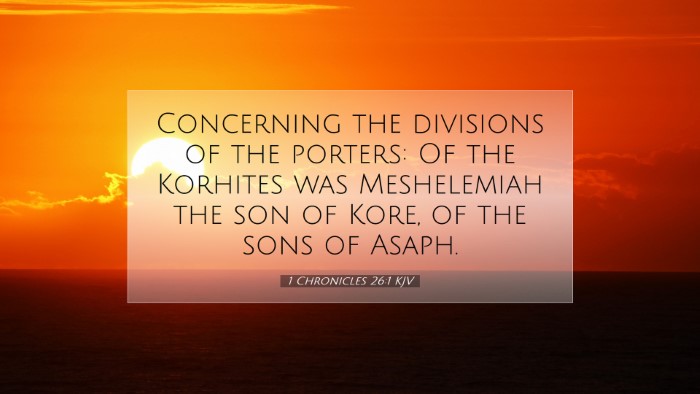Commentary on 1 Chronicles 26:1
Verse Reference: 1 Chronicles 26:1 - "Concerning the divisions of the porters: of the Korhites was Meshelemiah the son of Kore, of the sons of Asaph."
Introduction
The first book of Chronicles serves to recount the history of Israel from the perspective of its worship and priesthood. In chapter 26, we encounter a detailed description of the divisions of the porters, emphasizing the role of the Korhite family. This is crucial for understanding the organization within the House of God and highlights the importance of order and duty in service to the Lord.
Contextual Overview
This verse comes in a broader context where David organizes the Levites and sets apart individuals for various roles in the temple. The responsibility of the porters (or gatekeepers) was sacred, involving guarding the entrances to the sanctuary and ensuring that order was maintained in worship practices. Such organization reflects God's holiness and His desire for order in His house.
Key Characters
- Meshelemiah: The central figure in this verse, reflects exemplary traits of leadership and devotion.
- Kore: Meshelemiah's father, belonging to the Korhite family known for their devotion to the ministry.
- Asaph: Mentioned as part of the lineage, showing the interconnectedness of worship leaders within the Levite families.
The Role of the Porters
The porters had a vital role in the functioning of the Temple and in maintaining worship. Their duties were physical yet spiritually significant, recognizing the need for holiness in all acts related to divine service.
Significance of the Porter Ministry
- Guardianship: They were tasked with protecting the sacred space and ensuring that only those authorized could enter.
- Symbol of Order: Their role illustrates the importance of order, reflecting God's character.
- Service and Responsibility: Their duties were a direct service to God, reinforcing the understanding of ministry as a high calling filled with responsibilities.
Theological Reflections
In examining the roles defined in 1 Chronicles 26:1, we can draw several theological implications:
- Covenantal Worship: The specificity in roles underscores the sacredness of the covenant relationship between God and His people.
- Inclusivity in Service: The appointment of distinct roles highlights that every part of the body of Christ has value and purpose (1 Corinthians 12).
- God's Approach to Order: God values order and structure in His worship, which has implications for church organization today.
Commentators' Insights
Matthew Henry
Matthew Henry emphasizes the care that David took in organizing the temple service. He notes that the roles were not arbitrary but divinely appointed, reflecting God's order and the seriousness of worship practices.
Albert Barnes
Albert Barnes reflects on the significance of the porters as individuals set apart for sacred duties. He comments on how this reflects the holiness of God and the necessity for reverence in approaching God.
Adam Clarke
Adam Clarke discusses Meshelemiah’s qualifications and mentions the importance of lineage in Jewish culture. He stands as a protector of the holy things, a role that was both a privilege and a weighty responsibility.
Practical Applications for Today
For contemporary readers, particularly pastors and church leaders, this verse and its commentary provide vital insights applicable to church life today:
- Divine Order: A call to maintain order and structure within church governance and worship practices.
- Value of Each Role: Encouragement to recognize and appreciate the roles played by each member in church life.
- Discernment in Ministry: Reminds leaders to be prayerful and discerning in appointing individuals to roles within the church.
- Holiness in Worship: A reminder that how we approach and conduct worship matters greatly to God.
Conclusion
1 Chronicles 26:1 offers insight into the divinely ordained structure of service within ancient Israel, highlighting the significance of each role and the importance of maintaining order in worship. For pastors, students, and theologians, understanding these aspects encourages us to reflect on our own practices within the modern church, ensuring that we honor God's holiness through our organization and service.


